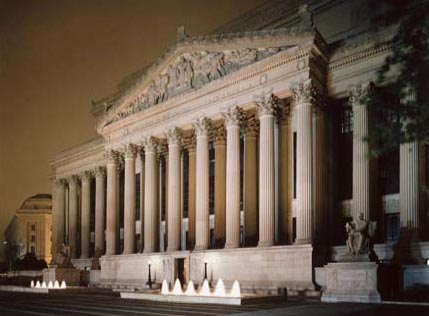The National Archives Marks 150th Anniversary of Medal of Honor
Document display honors nation’s heroes November 11, 2011 – January 16, 2012
 Washington, DC – The National Archives honors the 150th anniversary of the Medal of Honor with a special document display that runs from Friday, November 11, 2011, to Monday, January 16, 2011. For 150 years, the Medal of Honor has been America’s symbol that soldiers, sailors, marines, airmen, and coast guardsmen have the esteem of their fellow countrymen for deeds on the battlefield that are far above and beyond the call of duty. It has been awarded fewer than 3,500 times. The display will be in the East Rotunda Gallery of the National Archives Building which is located on Constitution Avenue at 9th Street, NW, and is open from 10 AM to 5:30 PM daily. Admission is free.
Washington, DC – The National Archives honors the 150th anniversary of the Medal of Honor with a special document display that runs from Friday, November 11, 2011, to Monday, January 16, 2011. For 150 years, the Medal of Honor has been America’s symbol that soldiers, sailors, marines, airmen, and coast guardsmen have the esteem of their fellow countrymen for deeds on the battlefield that are far above and beyond the call of duty. It has been awarded fewer than 3,500 times. The display will be in the East Rotunda Gallery of the National Archives Building which is located on Constitution Avenue at 9th Street, NW, and is open from 10 AM to 5:30 PM daily. Admission is free.
The display includes a Medal of Honor awarded – but never presented – to Sgt. James Hill, 14th New York Artillery, for extraordinary heroism on July 30, 1864, at Petersburg, Virginia – Sgt. Hill captured a flag and shot a Confederate officer who was rallying his men. Hill died in captivity at Andersonville, Georgia, before the medal could be presented.
The display also features a letter of recommendation for a Medal of Honor for Pvt. Samuel E. Eddy of Company D, 37th Massachusetts Infantry Regiment. At Sailor’s Creek, Virginia, on April 6, 1865, Pvt. Eddy came to the aid of the regimental adjutant, Lt. John S. Bradley, who was wounded and in mortal danger. Eddy left the safety of friendly lines, killed Bradley’s assailant thus saving the adjutant’s life, and was in turn bayoneted and pinned to the ground. While Eddy wrestled with his opponent, he reloaded his rifle, shot his foe, then removed the bayonet from his own body, and returned to friendly lines. The award of the Medal of Honor was authorized on August 24, 1897.
The National Archives holds both individual service records and unit records stretching from the American Revolution to the Gulf War, covering all branches of the military service. Of the 1.4 million cubic feet of permanently valuable records of the federal government stored in the National Archives, well over half relate to military affairs.
The National Archives Public Vaults permanent exhibition draws from this vast collection of records. One entire vault of the exhibition – “Provide for the Common Defense” – highlights the U.S. military. Documents and historic photos tell powerful stories of both individual heroism and collective sacrifice. Together with declassified records of strategy and tactics, these materials bring a human dimension to the tragedy of war. A special section on official citations for exemplary service features stories of seven Medal of Honor recipients.
History of the Medal of Honor
In 1782, General George Washington established the first formal system for rewarding acts of individual gallantry by the nation’s fighting men. The award consisted of a purple cloth heart. In 1847 during the Mexican-American War, a “certificate of merit” was established for any soldier who distinguished himself in action. No medal went with the honor.
During the Civil War, a resolution containing a provision for a Navy medal of valor “to be bestowed upon such petty officers, seamen, landsmen, and Marines as shall most distinguish themselves by their gallantry and other seamanlike qualities during the present war” was signed into law by President Abraham Lincoln on December 21, 1861. Section seven is a paragraph that created this nation’s highest honor in recognition of “gallantry in action.” Only 200 “medals of honor” were authorized by Lincoln to be awarded to enlisted members of the Navy “during the present war.”
Shortly afterwards, the Army introduced a similar resolution that was signed into law providing for a medal of honor “to such noncommissioned officers and privates as shall most distinguish themselves by their gallantry in action, and other soldier like qualities, during the present insurrection.”
Although it was created for the Civil War, Congress made the Medal of Honor a permanent decoration in 1863. Since the decoration’s creation, the President, in the name of Congress, has awarded more than 3,400 Medals of Honor, but only 842 since World War II when the requirements were tightened. Over the years, the medal has changed, going through revisions to the design, the rules under which it was awarded, and the inclusion of officers and members of the other branches of service.
For information on National Archives Public Programs, call (202) 357-5000, or view the Calendar of Events online.